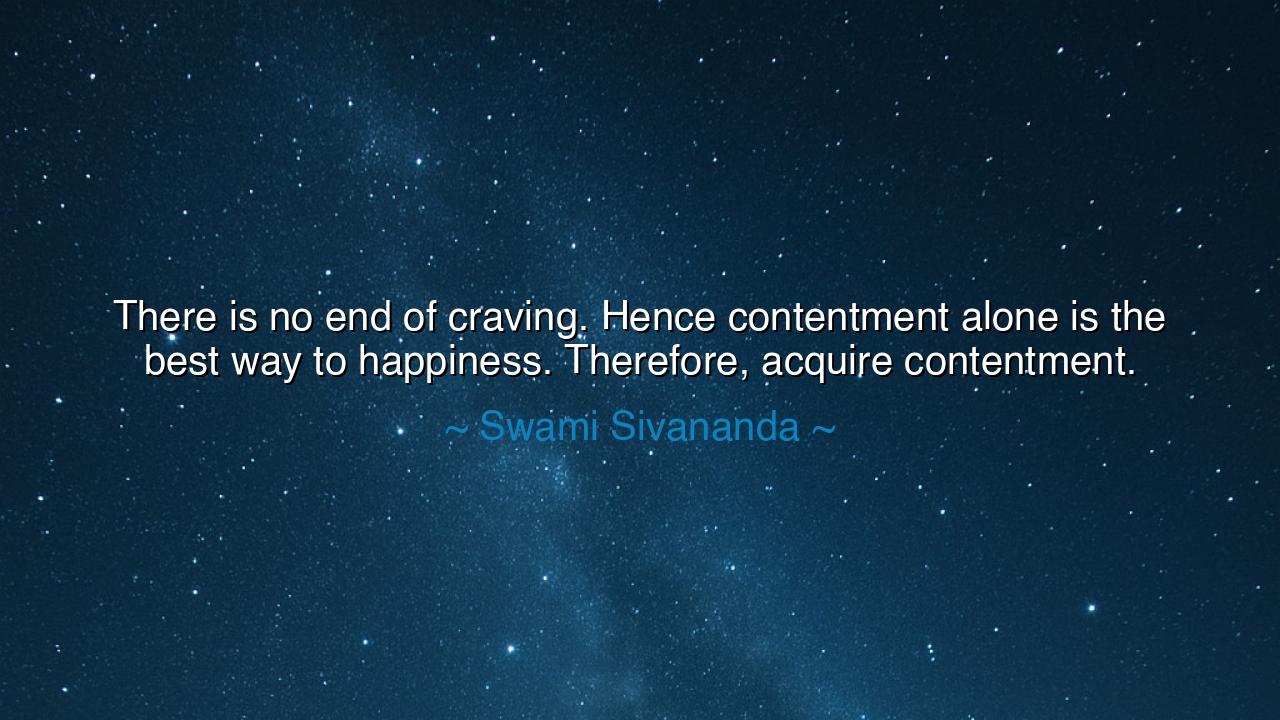
There is no end of craving. Hence contentment alone is the best
There is no end of craving. Hence contentment alone is the best way to happiness. Therefore, acquire contentment.






"There is no end of craving. Hence contentment alone is the best way to happiness. Therefore, acquire contentment." These profound words, spoken by the revered Swami Sivananda, resonate through the ages as a timeless call to the soul, urging it to seek not the endless chase for more, but the peace found in contentment. In a world that constantly pushes us toward accumulation—of wealth, power, knowledge, and possessions—Sivananda’s words remind us of a simple, yet profound truth: that true happiness is not found in the pursuit of endless desires, but in the cultivation of contentment.
What is craving but the endless yearning for that which is always just out of reach? Like a river that constantly flows toward the horizon, it can never be satisfied, for the horizon is always shifting further away. Craving is the insatiable hunger of the soul, the restless thirst that drives us to seek fulfillment in external things. We see this in the lives of many, from the conqueror who seeks to expand his empire, to the merchant who strives to increase his wealth, to the scholar who thirsts for more knowledge. No matter how much they acquire, it is never enough. There is always more to want, always a new desire that replaces the one that was just fulfilled. It is a cycle that brings temporary pleasure, but never lasting peace.
Yet, in the face of this endless craving, contentment stands as a pillar of serenity. Contentment, as Swami Sivananda teaches, is not the absence of desire, but the ability to find peace in what is already present. It is the quiet joy in the simplicity of life, in the moments that often pass unnoticed. The man who is content is not driven by the need to acquire or achieve, but by the recognition that he has enough, that in this very moment, he is whole. Contentment is the foundation upon which true happiness is built, for it teaches us to be present, to appreciate what we have, and to stop measuring our worth by what we lack.
Consider the life of Mahatma Gandhi, a man who, in his pursuit of freedom for his people, rejected the temptations of wealth and power. Gandhi lived simply, his desires few, his contentment profound. He once said, “The world has enough for everyone’s need, but not enough for everyone’s greed.” In the simplicity of his lifestyle, in his ability to be content with little, Gandhi found a happiness that was unshaken by the shifting tides of politics or the allure of material wealth. His was a happiness rooted in inner peace, in the quiet acceptance of what was, and in the unwavering belief that the pursuit of contentment would bring not only personal fulfillment but also collective well-being.
Contentment is not merely a passive state, however; it is an active pursuit of inner peace. It requires discipline, humility, and a willingness to let go of the constant clamor of desire. The warrior, whose armor is his contentment, faces the battles of life not with frustration or aggression, but with calm resolve. He knows that the storms of life—be they personal loss, political upheaval, or social unrest—are temporary, but that contentment is a lasting fortress within. The contented soul does not seek to conquer the world but to understand it, to accept it, and to move through it with grace and peace.
So, what lesson do we draw from Swami Sivananda’s wisdom? The chase for more—more wealth, more fame, more knowledge—will never end. It is an infinite pursuit that ultimately leads to exhaustion, not fulfillment. Contentment, on the other hand, is the gateway to a deeper form of happiness, one that is not dependent on external circumstances, but on the richness of the present moment. To live with contentment is to live with gratitude, to recognize that all we need is already within us, that happiness is not something to be attained, but something to be cultivated.
In practical terms, this means we must learn to slow down. Instead of always striving for the next goal or object, take a moment to appreciate what you have. Gratitude is the seed from which contentment grows. When we are grateful for the simple things—a roof over our heads, the warmth of a loved one’s embrace, the beauty of a quiet sunset—we begin to cultivate inner peace. We must also learn to detach ourselves from the relentless drive to acquire, recognizing that true freedom comes not from accumulating, but from letting go. When we choose contentment, we choose a life of fulfillment, not based on the world’s standards, but on the depth of our own soul.
Thus, the words of Swami Sivananda echo through the corridors of time, calling us to shift our focus from the fleeting and ephemeral to the eternal and enduring. In contentment, we find not just happiness, but the freedom to live fully, to appreciate the present, and to understand that in accepting what we have, we are truly blessed. The pursuit of more is an endless chase, but the pursuit of contentment brings us home. Let this be the guiding light of our lives—acquire contentment, and you will find happiness that never fades.






AAdministratorAdministrator
Welcome, honored guests. Please leave a comment, we will respond soon